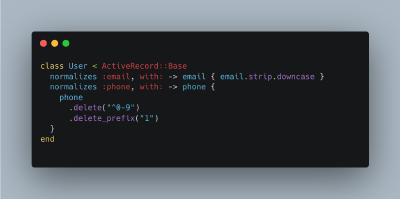New methods that help implement authentication in Ruby on Rails 7.1

The new version of Ruby on Rails 7.1 has many new features, some of which make writing your own authorization system easier. Let’s take a closer look at these helpers: normalizes, generates_token_for and authenticate_by.
normalizes #
The normalizes method in Ruby on Rails 7.1 is added to simplify the process of normalizing attribute values of a model. This method allows you to specify a list of attributes that need to be normalized before saving them to the database.
Example usage of the normalizes method:
class User < ApplicationRecord
normalizes :email, with: -> email { email.strip.downcase }
normalizes :phone, with: -> email { phone_number.gsub(/\D/, '') }
end
In the example above, when saving an instance of the User class, the values of the email and phone_number attributes will be automatically normalized, i.e., brought to a specific format.
Previously, before the introduction of the normalizes method, you had to use before_save or before_validation callbacks to normalize attribute values:
class User < ApplicationRecord
before_save :normalize_values
def normalize_values
self.email = email.downcase.strip
self.phone_number = phone_number.gsub(/\D/, '')
end
end
generates_token_for #
The generates_token_for method in Ruby on Rails 7.1 is added to automatically generate unique tokens for a specified attribute of a model. Tokens are commonly used to create unique identifiers or secret keys.
Example usage of the generates_token_for method:
class User < ApplicationRecord
generates_token_for :auth_token
end
In the example above, when creating a new instance of the User class, a unique token will be automatically generated for the auth_token attribute.
Previously, before the introduction of the generates_token_for method, you had to use before_create callbacks to generate unique tokens:
class User < ApplicationRecord
before_create :generate_auth_token
def generate_auth_token
self.auth_token = SecureRandom.urlsafe_base64
end
end
authenticate_by #
The authenticate_by method in Ruby on Rails 7.1 is added to simplify the authentication process for users. This method allows you to specify the attribute to authenticate_by and automatically creates the necessary methods for checking the correctness of the entered password.
Example usage of the authenticate_by method:
@user = User.authenticate_by(username: "...", password: "...")
In the example above, when calling the authenticate method on an instance of the User class, it will perform the authentication check by comparing the entered password with the value of the password attribute.
Previously, before the introduction of the authenticate_by method, you had to implement this logic manually:
@user = User.find_by(email: params[:email])
@user.authenticate(params[:password]) if @user.present?
These are just a few changes and new methods introduced in Ruby on Rails 7.1. It is recommended to refer to the documentation for more detailed information.